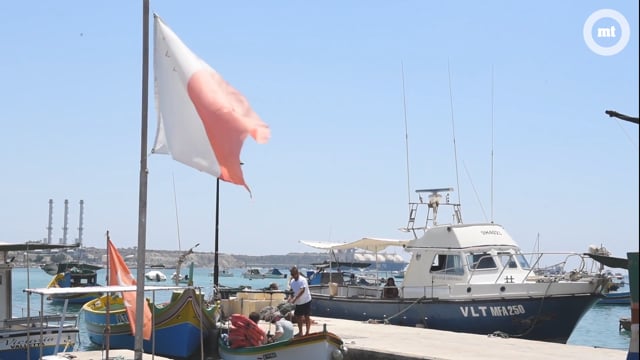Brussels to deal with lampuki dispute, Gozo fisher: ‘There will be blood, I’m sure’
Gozitan lampuki fishermen insist lack of action will drive them out of the industry

The European Commission will acknowledge a problem of ‘spatial dispute’ between Maltese and Tunisian fishermen on lampuki fishing, in an upcoming meeting of the General Fisheries Commission for the Mediterranean (GFCM) in Rhodes.
MaltaToday is informed that contracting parties, which include Tunisia and Malta, will be asked to accede to a management action plan for the use of the kannizzati, technically called Fishing Aggregating Devices (FADs), so that they can be identified better.
The plan would allow better knowledge on the impact of FADs on dolphin fish (lampuki), but also allow the GFCM to “freeze” the number of FADs during a transitional period so that it can regulate better the fishing practice and resolve the fishing dispute.

MaltaToday last Sunday brought to the fore complaints by fishermen who said they have been attacked by Tunisian fishers who were stealing their lampuki catches.
The issue was also brought to the Commission’s attention first by MEP candidate Peter Agius in 2018, and last week by Labour MEP Alex Agius Saliba, who added his voice to the concerns about Maltese fishermen.
‘There will be blood. I’m sure’
Lampuki fishermen fishing off the north-western coast of the island, are facing off Tunisian fishers who are repeatedly fishing off floats laid out by the Maltese, and even stealing their floating devices.
The clash has seen Tunisians threatening the Maltese with weapons and Molotov cocktails, while destroying the kannizzati prepared by the Maltese months before.
Eyewitnesses also spoke about a 65-foot vessel, nicknamed the ‘Bin Laden’, whose aggressive tactics are used to muscle the Maltese off their lines.
Yet Gozitan fishermen who spoke to MaltaToday on condition of anonymity said the situation has become a daily occurrence when they go out at sea.
Gozitans are, in fact, among the most badly affected by the Tunisians, as their kannizzati are laid out closer to Tunisian territory.
The fishermen, who are visibly frustrated at the situation, explained how their livelihood was in jeopardy as the number of Tunisian vessels increase every year. “The situation is unbearable, as they don’t even allow us to work,” they said.
“The Tunisians band in numbers of five boats or more, and proceed to fish, while one of their vessels keeps Maltese fishermen off the lines,” says one of the Gozitan fishermen who clashed with the ‘Bin Laden’ earlier on in the season.
“I actually found the 65-foot vessel’s crew fishing on my lines. When I proceeded to try and drive them away from the lines, they didn’t take it well, and proceeded to drive at full-speed towards me,” the fisherman said.
“It started steaming in my direction, at full speed, to try and ram my boat. I just started driving away at full speed, and at one point, the bow was as close as two feet away from the stern of my boat. Had we had any engine failure, God knows what would have happened,” the distraught fisherman said.
The fishermen also said they had witnessed some 10 men from the ‘Bin Laden’ crew standing at the front end of the vessel, threatening the Maltese fishermen. “I was scared. Imagine having ten men threatening you with machetes, big iron washers and Molotov cocktails,” he said.
The Tunisians also threaten the Gozitan fishermen by cutting loose the jablo floats used for their kannizzati: in one case, a fisherman says they left a knife stuck into them, engraved with the words ‘Made in Tunisia’.
The Maltese fishers are fearing the worst if the authorities do not tend to the situation. “Things will escalate, and there will be blood, I’m sure of it,” he said. “This job has become unfeasible. I am considering retiring. We’re already preparing for next season, but then we have to contend with these poachers. I am fed up,” one fisherman said.
The fishermen also claim they have lost €7,000 in damaged goods every season. “Every time we go out, we’re taking 30 kannizzati with us, because the Tunisians destroy what we have out there,” one of them said.
Anthony Gruppetta, the former Director General of Malta’s fisheries department, said the situation can only be resolved inside the General Fisheries Commission for the Mediterranean (GFCM), the regional body that ensures conservation and sustainable use of fish stocks.
The 24-party commission includes Malta and Tunisia.
Gruppetta said concerns had already been raised with Tunisian authorities back in 2002. “At first they had denied any poaching, but when photos and footage were presented to them, the fishing vessels were called in,” he said.
However, the peace did not last for long, and soon enough the poachers were once again harassing Maltese fishers.
Gruppetta said kannizzatti, technically called fishing aggregation devices (FADs) by the GFCM, cannot be used by other fishermen if they are correctly labelled with the permit or vessel number. “The situation out there is obviously quite different, and the Tunisians are not respecting international regulations,” he said.
“The lampuka was in the past not a commercialised fish, except in Malta and a few Italian coastal villages. Today a lot of countries are realising that dolphin fish are quite easy to catch, and come at a cheaper cost when compared to other species,” Gruppetta said.

















.png)



